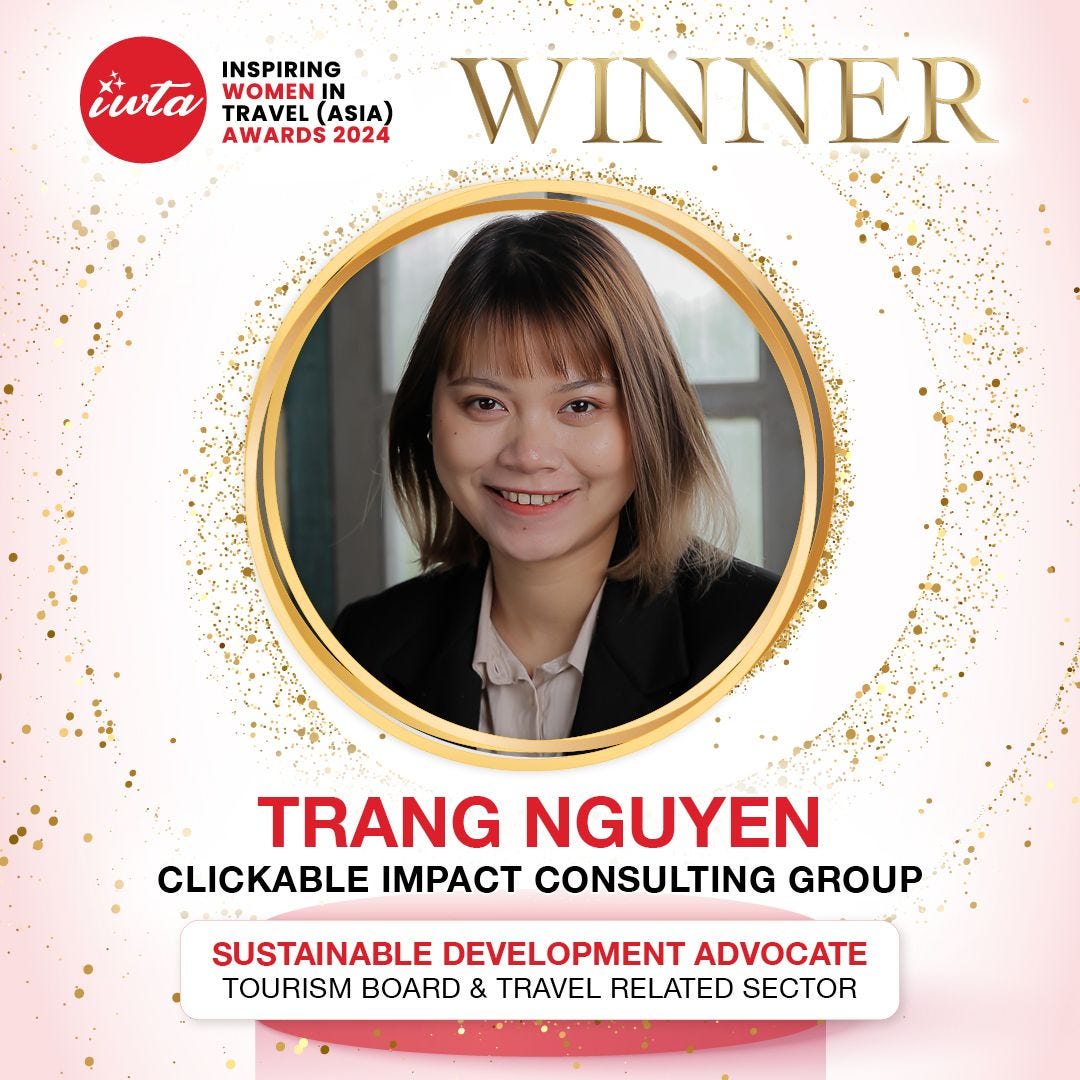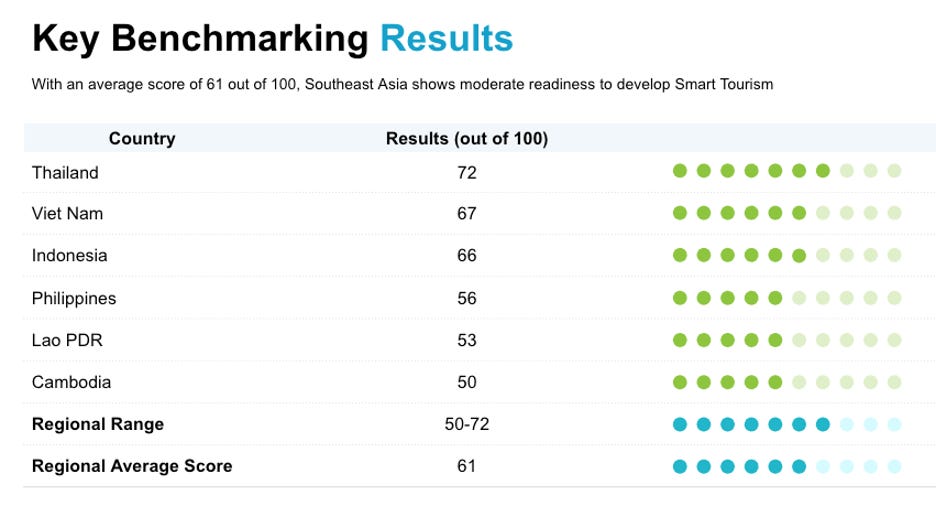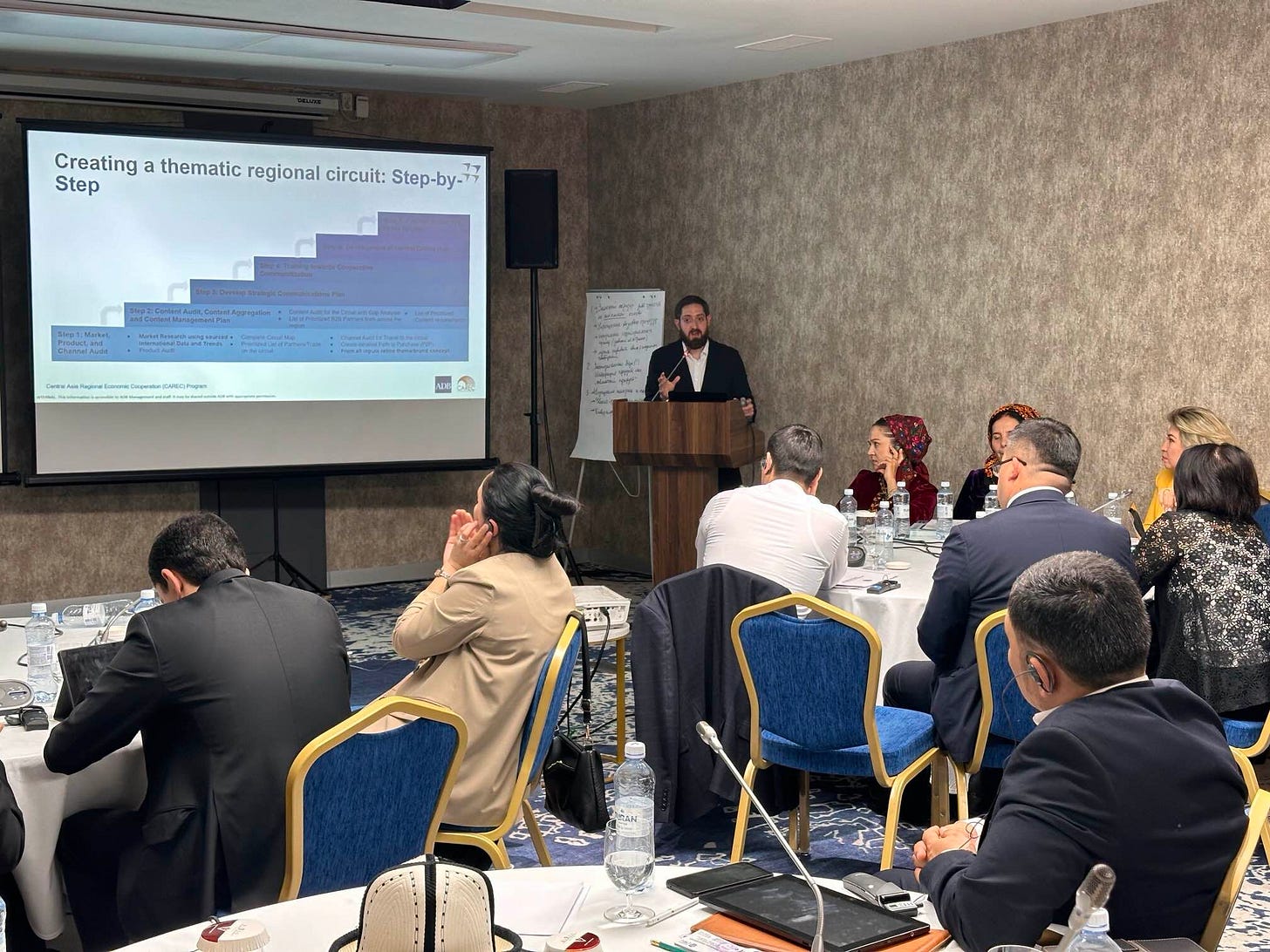Welcome back to Clickable Insights, written by Clickable Impact Consulting Group. Today’s newsletter focuses on the biennial, recently updated Travel & Tourism Development Index and what it means for Southeast Asia.
In other issues of Clickable Insights, you will find perspectives on agriculture, rural development, and green finance across Asia and the Pacific. Sign up for free to receive future editions!
The World Economic Forum’s Travel & Tourism Development Index (TTDI) is the reigning, pre-eminent measure of destination competitiveness. It is how the world’s national tourism organizations benchmark themselves against each other.
The TTDI assesses destinations based on 102 indicators across five dimensions: Enabling Environment; Travel and Tourism Policy and Enabling Conditions; Infrastructure and Service; Travel and Tourism Resources; and Travel and Tourism Sustainability.
The scores are an average computed through successive aggregations of indicators and pillars out of 7.0 - 1 being the worst and 7 being the best outcome. The rankings include 119 countries, with 119 being the worst and 1 being the best outcome. While scores are absolute, rankings are comparative, meaning it’s possible for destinations to make progress in every indicator and still fall in the rankings compared to peers.
The 2024 TTDI included mixed trendlines for Southeast Asia.
Singapore’s score topped Southeast Asia, ranking the city-state 13th out of 119 global destinations. Yet, that was a relatively precipitous fall from 2021 - the year the previous TTDI assessed - when Singapore ranked 9th.
Other Southeast Asian destinations slipping in the ranking include Thailand (from 36th to 47th), Vietnam (from 52nd to 59th), and Cambodia (from 79th to 86th).
Meanwhile, Indonesia surged ahead from a rank of 32nd in 2021 to 22nd in 2024. Malaysia stayed competitive, crawling up from 38th in 2021 to 25th in 2024. And the Philippines improved its ranking from 75th to 69th.
Vietnam’s ranking generated much consternation in domestic media. Tuoi Tre News, for example, ran the headline ‘Vietnam far behind SE Asian peers in tourism development ranking.’
There might have been some incremental improvement in its ranking had the report assessed it after implementing new visa policies in the second half of 2023. Changes included making 90-day e-visas available to all nationalities while increasing the number of nationalities eligible for visa exemptions to 25.
Nevertheless, a comparison to lower-middle-income peers reveals some interesting insights: Vietnam generally over-indexes on factors over which it has immediate control: Enabling Environment, Policy and Enabling Conditions, and even Sustainability. Vietnam under-indexes in areas that require longer-term investment: Infrastructure & Services as well as Resources (especially cultural and non-leisure).
Regional LMIC peers including Cambodia, Lao PDR, and the Philippines all show the same pattern - under-indexing on infrastructure, services, and resources.
Interestingly, the pattern breaks down when comparing Indonesia, Malaysia, and Thailand to upper-middle-income peers. While none of these destinations impressed WEF with their ground infrastructure, port infrastructure, or tourism services — their natural, cultural, and non-leisure resources (and Thailand’s airports) ran up their scores.
Clickable Tourism Consultant Wins ‘Inspiring Women in Travel’ Award
Last month Trang Nguyen, a senior consultant in our tourism practice group, won the Sustainable Development Advocate award at the Inspiring Women in Travel Awards Asia in Bangkok.
IWIT (Asia) is backed by Brand TD, a leading travel trade news agency. The award aims to inspire more women (and men) in the travel industry by championing the critical role of women in the travel space.
"It’s a great honor for me to receive such an award,” shared Trang. “This recognition not only validates the importance of sustainability in tourism but also reinforces my commitment to promoting sustainable tourism practices. By leveraging this recognition, I hope to engage with more stakeholders, decision-makers, and industry leaders to drive meaningful change and champion sustainability in all aspects of tourism."
ADB Publishes Clickable-Authored Smart Tourism Ecosystem Readiness Brief
Clickable Impact partner Trevor Weltman, meanwhile, was lead author on an Asian Development Bank brief titled ‘Smart Tourism Ecosystem Development Readiness in Southeast Asia’.
The brief tracks how Southeast Asian countries use smart technologies to make their tourism sectors more competitive, inclusive, and sustainable, and outlines the complex infrastructure challenges they face.
Using a quantitative benchmarking framework based on existing smart cities, digital readiness, and tourism competitiveness indices like the TTDI, the brief found that Southeast Asia has “moderate readiness” to develop smart tourism ecosystems.
Thailand scored 72 out of 100, signifying that it is entering high smart tourism ecosystem development readiness. The other five countries assessed displayed moderate readiness to develop smart tourism ecosystems, with Vietnam scoring 67 and Indonesia scoring 66, followed by the Philippines (56), Lao PDR (53), and Cambodia (50).
Advising regional cooperation for tourism in Central Asia
Trevor also recently delivered digital marketing training in Kazakhstan for five countries under the Central Asia Regional Economic Cooperation (CAREC) Program, and will soon attend a CAREC Tourism Working Group meeting in Turkey to lead a discussion on sub-regional cooperation frameworks for tourism for all 10 CAREC countries.
Thanks to Clickable Impact consultants Mike Tatarski, Trang Nguyen, Graham Harper, Khanh Nguyen, and Trevor Weltman for their contributions to this newsletter.
Back next month with more developments in climate action, transformative innovation, and sustainable tourism.
Clickable Insights is brought to you by Clickable Impact
Clickable Impact is an Asia-based consultancy committed to climate action and sustainable development. We have three practice areas: public affairs and communications, sustainable tourism, and transformative innovation. Across our work, Clickable Impact favors projects that urgently mobilize private sector engagement, policy action, and investment.
All views expressed in this newsletter are our own.
Copyright © 2024 Clickable Impact, All rights reserved. You are receiving this email because you opted in via our website.
Our mailing address is:
House 20A, 11/5 To Ngoc Van, Quang An, Tay Ho
Hanoi, Hanoi 11207
Vietnam








